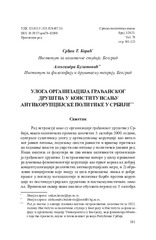Приказ основних података о документу
Uloga organizacija građanskog društva u konstituisanju antikorupcijske politike u Srbiji
| dc.creator | Bulatović, Aleksandra | |
| dc.creator | Korać, Srđan | |
| dc.date.accessioned | 2023-04-07T08:16:16Z | |
| dc.date.available | 2023-04-07T08:16:16Z | |
| dc.date.issued | 2023 | |
| dc.identifier.issn | 0354-5989 | |
| dc.identifier.uri | http://rifdt.instifdt.bg.ac.rs/123456789/2816 | |
| dc.description.abstract | Рад истражује како су организације грађанског друштва у Србији, након политичких промена започетих 5. октобра 2000. године, одиграле суштинску улогу у артикулисању корупције као виталног јавног питања, подизању свести јавности и вршењу притиска на тадашње власти да уврсти ово питање у политички дневни ред. Наша анализа се фокусира на два нивоа активности организација грађанског друштва: 1) истраживачке напоре у циљу правилног разумевања феноменологије корупције као првог корака ка доброј концептуализацији различитих антикорупцијских мера, и 2) образовне иницијативе које имају за циљ преношење знања и добре праксе у погледу методологије и политике борбе против корупције из постиндустријских друштава и других посткомунистичких земаља. Временски оквир наше анализе обухвата период од 5. октобра 2000. до децембра 2005. године, који видимо као почетну фазу ангажовања организација цивилног друштва у антикорупцијској политици у Србији, пре доношења прве националне антикорупцијске стратегије. Упркос широком спектру активности и скромним ресурсима, организације грађанског друштва су имале утицај на деловање власти, јавних институција и медија. Аутори закључују да су антикорупцијска достигнућа српских организација грађанског друштва у посматраном периоду била релативно ограничена хроничним дефицитом политичке, професионалне и моралне одговорности свих друштвених актера, а што је све посредно исход „системске грешке” у стратешком осмишљавању јавних политика у борби против корупције – непрепознавање одсуства партиципативне политичке културе. | sr |
| dc.description.abstract | The paper illuminates how civil society organisations in Serbia, in the aftermath of the political changes initiated on 5 October 2000, played the essential role in articulating corruption as a vital public issue, raising awareness of the public, and putting pressure on the then governments to include this issue in the political agenda. Our analysis focuses on two planes of civil society organisations activities: 1) research efforts aimed at properly understanding the phenomenology of corruption as the first step towards sound conceptualisation of various anti-corruption measures, and 2) educational initiatives aimed at transferring knowledge and good practice in anti-corruption methodology and policies from post-industrial societies and other post-communist countries. The timeframe of our analysis embraces the period from 5 October 2000 to December 2005, which we see as the initial phase of engaging civil society organisations in anti-corruption policy in Serbia, before the National Anti-Corruption Strategy was adopted. After the changes in October 2000, civil society organizations in Serbia have acted as a significant factor in raising public awareness of corruption as well as in building anti-corruption institutional and normative infrastructure. From campaigns that targeted all stakeholders (citizens, media, business sector, decision makers) aiming at changing their priorities and interests, to participating in the set-up of public policies in the field of rule of law and monitoring the implementation of anti-corruption laws and strategic commitment, civil society organisations that operated within very wide range of activities, successfully influenced both the institutions and the general public. Despite wide range of activities and modest resources, civil society organisations had an impact on actions of the government, public institutions, and the media. The fight against corruption became one of the central issues in the then Serbia’s political debate. Yet the anti-corruption achievements of Serbian civil society organisations in the period 2000–2005, were limited due to a chronic deficit of political, professional, and moral responsibility of all social actors, resulting in “systemic error” of public policies strategic design aimed at combating corruption – the lack of a participatory political culture. The lack of a participatory political culture in citizen action has limited efficiency in achieving development policy goals, and in implementation and monitoring of public policies relevant to curbing corruption. Belief has been established, that citizens do not ask questions and therefore do not have the power to exercise policy influence nor to shape the environment in which they live. As the concept of political community is a special construct based on democracy and human rights, non-inclusiveness as previously outlined here destructively affected society by making deeper asymmetries of all kinds due to disintegrating influence that prevents the final community constitution through democratic institutions. | sr |
| dc.language.iso | sr | sr |
| dc.publisher | Beograd: Institut za političke studije | sr |
| dc.relation | info:eu-repo/grantAgreement/MESTD/inst-2020/200025/RS// | sr |
| dc.rights | openAccess | sr |
| dc.rights.uri | https://creativecommons.org/licenses/by/4.0/ | |
| dc.source | Srpska politička misao | sr |
| dc.subject | организације грађанског друштва | sr |
| dc.subject | грађанско друштво | sr |
| dc.subject | корупција | sr |
| dc.subject | антикорупцијска политика | sr |
| dc.subject | транзиција | sr |
| dc.subject | демократија | sr |
| dc.subject | civil society organisations | sr |
| dc.subject | civil society | sr |
| dc.subject | non-governmental sector | sr |
| dc.subject | corruption | sr |
| dc.subject | anti-corruption policy | sr |
| dc.subject | transition | sr |
| dc.subject | democracy | sr |
| dc.title | Uloga organizacija građanskog društva u konstituisanju antikorupcijske politike u Srbiji | sr |
| dc.type | article | sr |
| dc.rights.license | BY | sr |
| dc.rights.holder | Srpska politička misao | sr |
| dc.citation.issue | 1 | |
| dc.citation.volume | 73 | |
| dc.citation.spage | 101 | |
| dc.citation.epage | 123 | |
| dc.identifier.doi | 10.5937/spm79-42800 | |
| dc.type.version | publishedVersion | sr |
| dc.identifier.fulltext | http://rifdt.instifdt.bg.ac.rs/bitstream/id/9761/SPM-79-5.pdf |

